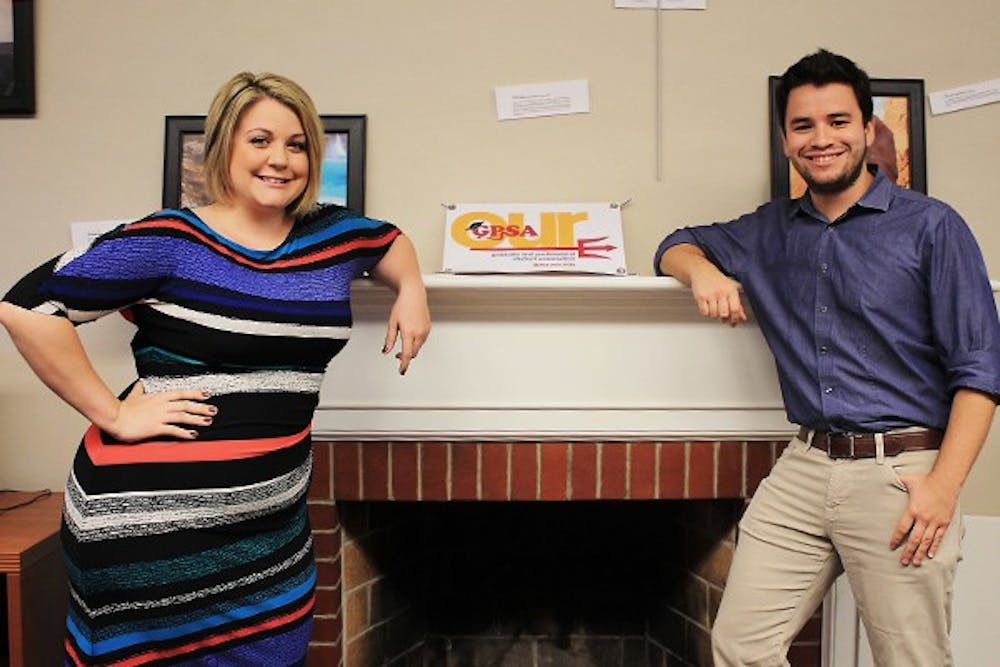 Former GPSA President Megan Fisk poses with the current GPSA President German Cadenas at the Graduate Student Center in Tempe on Monday, Sept. 22, 2014. They both were influential in passing the pay-raise approved for teacher assistants at ASU. (Photo by Shiva Balasubramanian)
Former GPSA President Megan Fisk poses with the current GPSA President German Cadenas at the Graduate Student Center in Tempe on Monday, Sept. 22, 2014. They both were influential in passing the pay-raise approved for teacher assistants at ASU. (Photo by Shiva Balasubramanian)
ASU student governments worked diligently last year to pass the Athletic Fee Bill in order to provide better services to students at ASU. Students will now be seeing some of the benefits of the fee with teaching assistants receiving raises in their next pay period.
The goal of the athletic fee is to not only allow students to receive free tickets to all sporting events but to reinvest the $10 million previously taken from tuition into programs and services for students.
Communications graduate student and former GPSA President Megan Fisk said ASU teaching assistants will be making at least the livable wage for Phoenix as calculated by MIT’s index, which is roughly $19,000.
"Since teaching assistant appointments are typically only nine months and the $19,000 is based on 12 months, the minimum amount a teaching assistant should be paid is about $14,250 for the academic year," she said.
The average salary for teaching assistants last year was $15,745, but some academic divisions, such as the Walter Cronkite School of Journalism and Mass Communication, the Herberger Institute for Design and the Arts and the College of Liberal Arts and Sciences, were paying between $10,000 and $12,600 per academic year, Fisk said.
 Former GPSA President Megan Fisk stands outside the Graduate Student Center on the Tempe campus on Monday, Sept. 22, 2014. (Photo by Shiva Balasubramanian)
Former GPSA President Megan Fisk stands outside the Graduate Student Center on the Tempe campus on Monday, Sept. 22, 2014. (Photo by Shiva Balasubramanian)
Senior Vice President of Education Outreach James Rund said he thinks the raises are important for the compensation of the top level graduate students at ASU.
"This is an implementation of the first step for adequate compensation for teaching assistants," he said. "Our goal is to provide quality compensation for our teaching assistants."
The raise in pay is being seen as a victory for what the athletic fee was intended when first discussed during the 2013 fall semester.
"I see this as a great victory for GPSA and a demonstration of the shared governance ASASU has with the administration and academic departments as well as reflective of the nature of ASU’s shared governance system," Fisk said.
The shared governance system exercises in collarborative and inclusive ways, Fisk said.
"Our shared governance model is not one that would lead students to have a sit-in in the provost office like they did at University of Houston, for instance," she said. "I think sometimes ASASU’s lack of public protest and dissent is taken as inaction, and I hope that the reinvestment of tuition money demonstrates the power students really do have at ASU."
Current GPSA President German Cadenas said the raises are a very positive first step in the right direction for compensating teaching assistants correctly.
"This will mean that teaching assistants who were below the living wage in Phoenix will now have a better standard of life," he said.
The raises will also be better for teaching assistants in the humanities and arts fields, which do not compensate as well as the science fields, Cadenas said.
 GPSA President German Cadenas poses at the Graduate Student Center, which also houses GPSA, on the Tempe campus on Monday, Sept. 22, 2014. (Photo by Shiva Balasubramanian)
GPSA President German Cadenas poses at the Graduate Student Center, which also houses GPSA, on the Tempe campus on Monday, Sept. 22, 2014. (Photo by Shiva Balasubramanian)
The collaboration was also praised by Cadenas, who said the raises show the type of positive impact that can be made by students.
"This is a very positive change for graduate students, but it didn't happen in a vacuum," Cadenas said. "It was a great collaboration between the student governments, administrators and Dr. Crow."
More work is yet to be done to further benefit graduate students, Fisk said.
"There is still more to be resolved with teaching assistant appointments, and $14,250 isn’t a lot of money, but it’s definitely progress," she said. "In the future, GPSA will need to work with the Provost and Vice Provost of Graduate Education to enforce 20-hour work weeks and increase the funding available for the summer months."
Cadenas said the benefits of the athletic fee are now taking place and the pay raises for teaching assistants would have never happened without the diligence of Fisk.
"This is really Megan's legacy as president of GPSA," Cadenas said.
Reach the reporter at jshanco2@asu.edu or follow on Twitter @joey_hancock
Correction: Photo captions in an earlier version of this story misspelled Megan Fisk's name. They've been updated.




